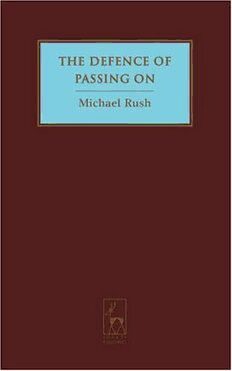
The Defence of Passing On PDF
290 Pages·2006·1.323 MB·English
Most books are stored in the elastic cloud where traffic is expensive. For this reason, we have a limit on daily download.
Preview The Defence of Passing On
Description:
There is dispute regarding the identity and existence of a loss-based defense in the law of unjust enrichment. Widely known as 'passing on', but better identified as 'disimpoverishment', this defense has generated confusion and disagreement across and within England, Australia, Canada, and the US. This book addresses these problems in three ways. First, by providing a solution to the defense's terminological problems and presenting a coherent picture of the current state of the law. Secondly, by examining whether a defendant's unjust enrichment can be said to have come at the expense of' a claimant when a third party has borne the cost of that enrichment. Put another way, whether awards of restitution are, or should be, restricted by the value of a claimant's loss. And finally, by analyzing the reasons in favor of accepting or rejecting a loss-based defense in the law of unjust enrichment. Numerous scholarly textbooks and law journals have devoted space to these issues. This work is more narrowly focused on either particular cases or sets of issues. The book examines this deficiency by collating, and providing total coverage of, the controversies and questions pertaining to a loss-based defense in the law of unjust enrichment. The Defence of Passing On will be essential reading for anyone interested in the law of restitution, and in its relationship with other areas of private law.
See more
The list of books you might like
Most books are stored in the elastic cloud where traffic is expensive. For this reason, we have a limit on daily download.
